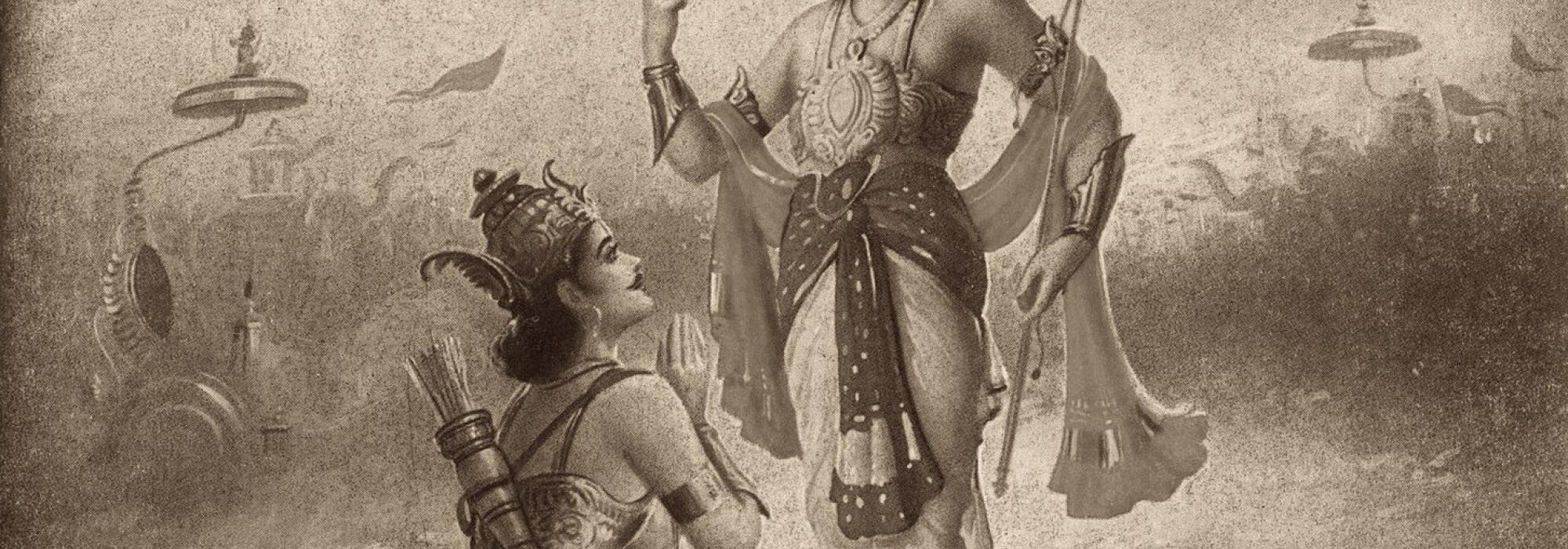At this point, as an example of the severity of the result of one’s own experience, we can recollect the episode of the blind king Dhṛtarāṣṭra. Vyāsa offered to give him the capability to witness the scenes in the battlefield.
yadi tv-icchasi saṅgrāme draṣṭum-enaṃ viśāmpate।
cakṣur-dadāni te hanta yuddham-etan-niśamaya॥
(Bhīṣma-parva 2.6)
Dhṛtarāṣṭra replied –
na rocaye jñāti-vadhaṃ draṣṭuṃ brahmarṣi-sattama।
yuddham-etat-tv-aśeṣeṇa śṛṇuyāṃ tava tejasā॥
(Bhīṣma-parva 2.7)
I do not want to watch the massacre of kinsmen with my own eyes but I am interested in the war. Therefore, grace me so that I can hear about the occurrences in the war. Acceding to this request, Vyāsa bestowed upon Sañjaya the capability to view the battle from afar and arranged for him to narrate it to Dhṛtarāṣṭra.
Dhṛtarāṣṭra was Arjuna’s senior. He was older and more experienced. Therefore, he did not want to witness the horrors of the battle with his own eyes. The effect of sight on the mind is more acute than that of hearing. The eyes cannot bear as much as the ears do.
The reasons that Arjuna gave to justify his aversion for war are required to be pondered upon by all those who are desirous of knowing about dharma –
- It is not good to kill one’s own relatives.
- “Na kāṅkṣe vijayam” – I do not desire to win.
- “Kiṃ no rājyena kiṃ bhogaiḥ” – What is the use of kingdom and enjoyment?
- “Kiṃ jīvitena” – What is the use of living?
- “Pāpam-evāśrayedasmān” – We will only accrue sin by this battle.
- “Lobhopahata-cetasaḥ” – Should we become afflicted by avarice?
- “Kula-kṣaya-kṛtaṃ dośaṃ” – Corruption that causes the annihilation of the entire clan.
- “Mitra-drohe ca pātakam” – The pāpa of betraying friends.
- “Kula-dharmāḥ praṇaśyanti” – The dharma of the entire race will be destroyed.
- “Dharme naṣṭe adharmo’bhibhavati” – When dharma is destroyed, adharma will dominate.
- “Praduṣyanti kula-striyaḥ” – Virtuous women will also debase themselves.
- “Jāyate varṇa-saṅkaraḥ” – Different varṇas will mix together.
- “Saṅkaro narakāyaiva” – This inter-mingling will pave the way to naraka.
- “Patanti pitaraḥ” – The pitṛs will be dragged down.
- “Utsādyante jāti-dharmāḥ kula-dharmāś-ca” – The individual dharmas of different jātis and clans will be ruined.
And so on and so forth.
In this list of the evils of war, there is no mention of mokṣa; there is no thirst to know oneself; nor is there a dialogue about human nature. This is what we have to always keep in mind because the Gītā discusses these three key points. Why did they appear in Kṛṣṇa’s answer although they were not present in Arjuna’s question? To know this, we have to completely understand the fundamental parts of Arjuna’s question. The feelings hidden in the above list of Arjuna's arguments may be divided into four groups –
- The necessity of pity
- Being scared of pāpa
- Being detached from worldly enjoyment
- Being rooted in dharma, having deep śraddhā in it
Which of these four can we reject? Haven’t we always been taught that we should practise the above four qualities? What is the deficiency in Arjuna's argument then? Why did Kṛṣṇa not agree to it?
The first chapter of the Gītā has always been called the ‘Yoga of Arjuna’s despondency.’ True, there is despondency here. But is it the sole subject this chapter deals with? There is a reason behind Arjuna’s despair. There is also a direction to it. We should understand both.
The outcome of Arjuna’s excessive pity was his reluctance to fight. By killing, he would not only lose his loved ones but also invite pāpa. Arjuna also wanted to escape from this pāpa. Is this endorsed by dharma? In a righteous war, is killing adharma? Is there any situation where killing a living being becomes dharma? This has to be deliberated upon. Had Arjuna understood the nature of dharma? Were the doubts he had about the duties of a kṣatriya correct? What is dharma? It becomes necessary to contemplate upon this.
Distress can be caused by anything. It can be caused by the feeling of inadequacy of strength, or by a hesitation that the gods may not be pleased; or by the hopelessness that he may not be a partner to profit in future; or the fear that he himself may be injured or even die. None of these were the reasons for Arjuna’s despair; it was caused by excessive love. Sañjaya describes him thus –
taṃ tathā kṛpayāviṣṭam... (BG 2.1)
Arjuna is completely controlled by his love and pity. Kṛṣṇa's answer is that his pity is unfounded there. There is no doubt that mercy is a fine quality. But it is acceptable if it is exercised upon a worthy object in a worthy manner, not otherwise.
Pity is a kind of mental alteration. It has to be born, by itself, within us. It does not need outside force or even any influence. As Bhavabhūti said,
vyatiṣajati padārthān-āntaraḥ ko’pi hetur-
na khalu bahir-upādhīn prītayaḥ saṃśrayante।
(Uttara-rāma-carita 6.12)
The thread that binds people together is something that is within their hearts. Love is not based on outward support. That inward object is brought into being by Nature. Just because it is natural, it cannot be concluded that such pity is acceptable or beneficial. Whether something is beneficial or hurtful should be decided only after due contemplation. Arjuna's pity, in that sense, is not brought about by deliberation. It was an impulse of the moment. Impulse is hasty and is not enough to cultivate belief. Proper consideration and reflection should eliminate the improprieties of the emotion. Emotion thus justified by discrimination becomes acceptable.
Probably with this in mind, Śrī Yāmunācārya calls Arjuna’s pity ‘asthāna-kāruṇya’ – compassion at a wrong time and wrong place. Arjuna’s intemperate and inconsiderate pity can be classified as a sentiment. Sentiment is emotion, or even excessive emotion. The heart when it does not submit itself to being examined by the head becomes agitated, it is sentimental. Bhagavān calls this ‘hṛdaya-daurbalya’ – weakness of the heart. The softer the heart, the shallower it is, the weaker it becomes. We can call it the quagmire of tears. It may be said that this kind of flaccidity and unsteadiness is characteristic of our times.
To be continued...
The present series is a modern English translation of DVG’s Kendra Sahitya Akademi Award-winning work, Bhagavad-gītā-tātparya or Jīvana-dharma-yoga. The translators wish to express their thanks to Śatāvadhāni R Ganesh for his valuable feedback and to Hari Ravikumar for his astute edits.











































